Evanna Lynch Talks with MuggleNet About Being True to One’s Self
In the Potterverse, Evanna Lynch may be known for her role as Luna Lovegood, but her advocacy for being true to one’s self has become a greater reason for adoration from Harry Potter fans. In her new film, My Name Is Emily, Evanna returned home to Ireland to bring Irish culture to life on screen through the eyes of a defiant and determined 16-year-old.
After losing her mother in a tragic accident, Emily and her father are a fairly odd dynamic duo, whom most people think are crazy. After one particular incident, Emily’s father is taken from her and institutionalized. Emily enters the foster care system, and she becomes an outcast at school – scrutinized by both peers and teachers. When her father’s annual birthday card fails to arrive in the mail, Emily enlists Arden – the only fellow student to ever try to befriend her – to travel north with her to break her father out of the mental health facility.
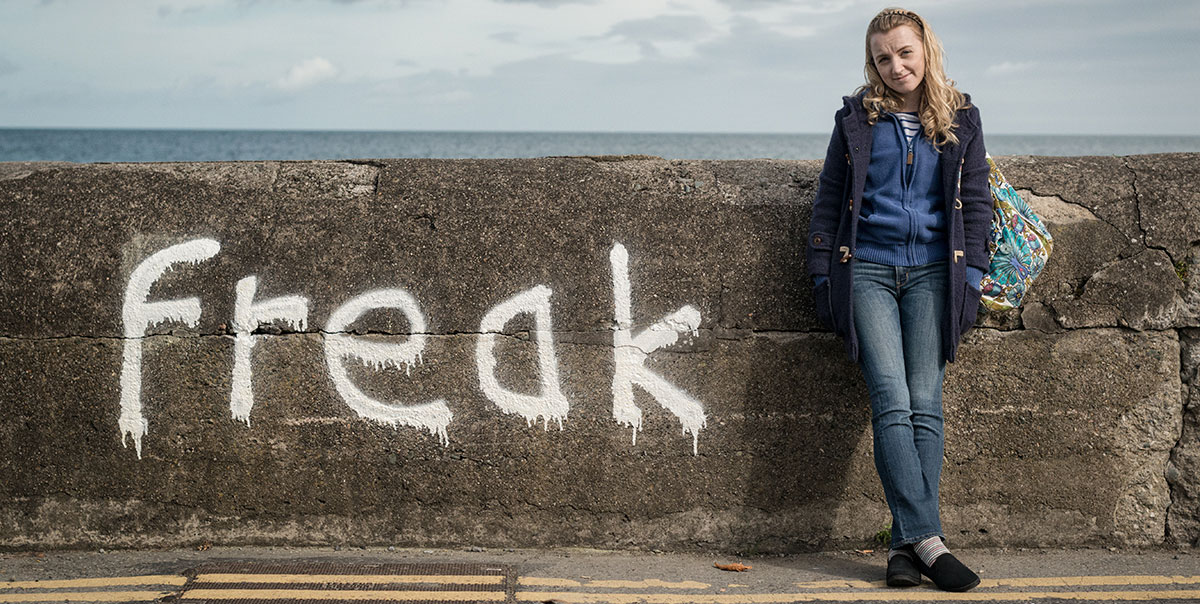
Evanna Lynch on the set of “My Name is Emily”
With the tragic death of her mother, and quirkiness of her and her father, it would be difficult not to notice the similarities between Emily and our favorite Ravenclaw. When asked about the two characters, Evanna discussed the similarities between Luna and Emily:
There are a lot of similarities, I think, and it’s so true in her family life as well. Even the fact that [the father is] the philosopher and has all these crazy ideas and attracts this cultish following is very similar to Xenophilius. What attracts me to all characters is just authenticity and that boldness of self-expression, which I think they both do. Luna does it effortlessly in that she’s who she is, and she has no problem with that, and she doesn’t ever try to inhibit or change herself. And I think Emily is the same way, slightly more defiantly. I think Emily is a lot angrier at the world and sees so much fakery and pretension among her teenage peers, and I think she rebels against that by being so authentic and so true to herself. I just admire women like that because I, certainly growing up, felt unusual, felt odd, and felt I didn’t really have a place where I fit. But I always felt uncomfortable like that, and those women, like Emily and like Luna, […] give me the confidence to just fit in that uncomfortable space.
Both the characters of Emily and Luna are independent and true to themselves, despite what their enveloping societies tell them. Luna tends to be optimistic in the face of adversity – hopeful and full of sunshine – even though she has experienced roughly the same tragic past as Emily has. Emily, on the other hand, is rougher around the edges and cynical. Evanna discussed how, despite their similar pasts, both independent characters are relatable to the audience in light of their differences:
I think it’s that everyone has that urge to be themselves. So when they see someone else being that boldly and unapologetically, they’re inspired to just be that and to let themselves be. Because it is such a relief. I always remember whenever I would come back from a break from filming the Potter movies and come back to Luna; every time I would get into her costume and get into that mindset, I would just feel such a huge relief to not have to pretend and to not have to worry about what people think. Because that was Luna’s essence, that she didn’t take on other’s opinions and she was so comfortable with who she was. So I think it’s that we see that. We see them being true to themselves, and Emily just saying exactly what she feels in every moment and say, ‘Oh yeah, I feel that too! I just wish I could. I wish I wouldn’t upset people or it wouldn’t cause controversy when I was that way.’ So it’s almost like a yearning to get back to who you are. It’s characters like that [that] give you permission to be yourself. I think that’s what it is.
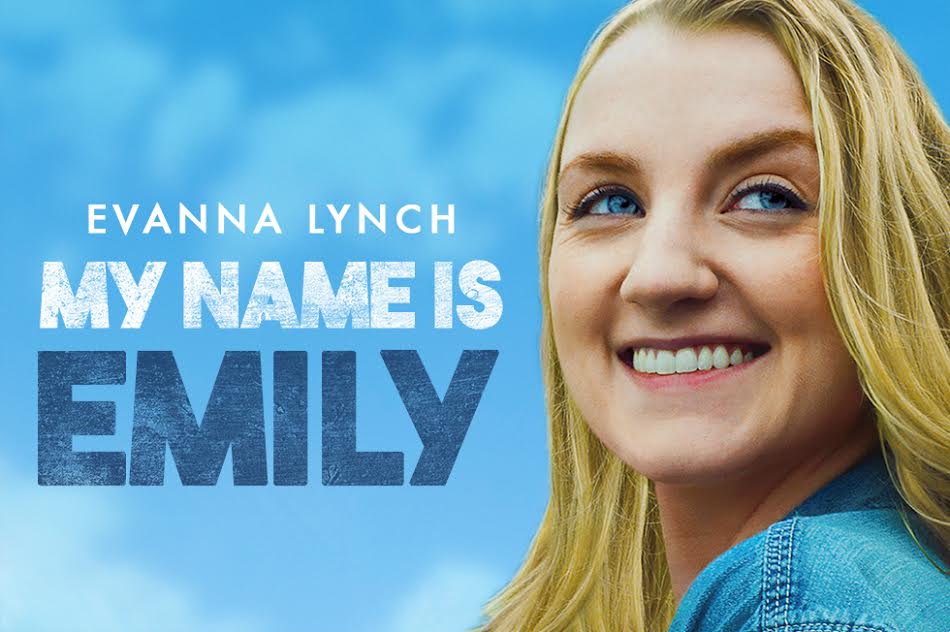
Evanna Lynch, promotional poster for “My Name is Emily”
As Emily and her friend Arden travel north, both teenagers face a journey of personal discovery through their brokenness and woundedness, a metaphorical journey most audience members can relate to in one way or another. We discussed the emotional heaviness of the film, the characters’ interior journeys, and the lessons Evanna would like the audience to take away from the film.
Just like the characters of her two leading roles as Luna and Emily, Evanna emphasized the importance of staying true to one’s self, not caring what others think. Like many of us, it is something that Evanna is striving to do consciously. We discussed the biggest takeaways of the film, especially for female audience members.
[You] being truthful will connect you to the right people. You having the guts to put yourself out there unfiltered, uncensored… that’s how you meet the people and that’s how you have the most growth. There have been times where I will try [to] hide certain parts. Even recently, about two years ago, I started being more vocal about […] veganism and animal rights. I really thought that there was going to be a backlash and people were going to argue with me and turn against me. And there certainly was to a certain extent, but there was far more love and far more reactions from people saying, ‘Oh yeah, this is what I believe too and keep going.’ That was just such a lesson to me that the sooner you own up to who you are, the sooner you’ll find out what you’re supposed to do and who you’re supposed to work with and live with. So yeah, I think both of those characters embodied that just by… ultimately, you can’t be anyone but who you are, and sometimes we just take too long hiding from that, and it only holds you up from your journey… yeah, holds you back.
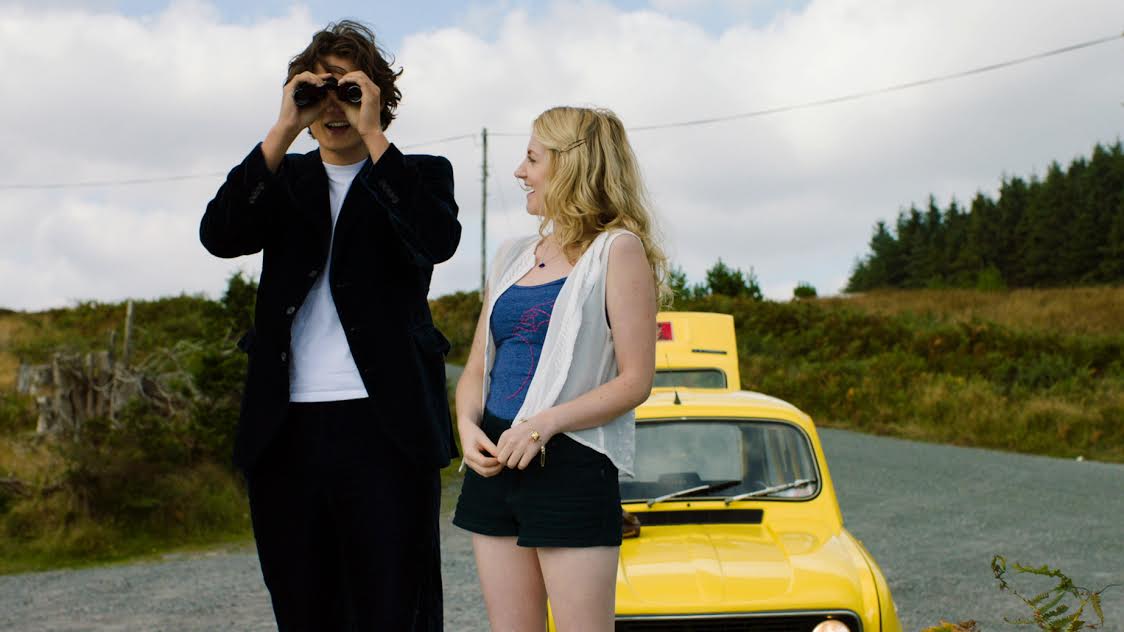
Evanna Lynch and George Webster on the set of “My Name is Emily”.
Much of Emily’s interior journey comes from a background of emotional hurt and betrayal. Her parents, the two people who taught her to love the most deeply in her life, were taken from her. Emily’s relationship with her father influences her in many ways. Evanna opened up about what she thought of her character and her relationship with her father:
Emily […] is a lot more mature and a lot [wiser] than [her father] in that respect, that she… she is trying to… she doesn’t know how to deal with grief, but she’s at least not hiding from it. She’s not pretending it doesn’t exist. And that’s actually something I’ve really noticed in… I used to be a lot more into self-help books and that than I am now because I found [that] a lot of them are… it is actually what Emily talks about in the film, that they give you this pressure to be happy, and there is always this idea that the end goal is happiness. But what if you’re not feeling happy and… it’s as if all the other feelings you have are not valid or they’re not right, and you shouldn’t have them, and I think that’s very damaging. That’s not something you want to teach to people – young people, especially – and I think that only makes mental illness worse and more challenging when you don’t acknowledge those feelings. So I love that Emily is able to… even though she can’t really explain it to [her father], she is able to feel, and she’s not afraid to feel and that she is pushing her dad to feel and just to be real and to stop running away if he wants to.
I suppose she does take after her father in that she thinks she can win by knowing things, and she doesn’t… at first, she doesn’t have a lot of respect for Arden because he puts everything out there. He shows all his feelings. He’s so uninhibited about who he is and what he feels for her. He doesn’t disguise that, and I think that that’s very… that puts Emily on guard. It makes her more wary of him because I think Emily is someone who… she doesn’t take well to being abandoned or being betrayed. I think she feels things very deeply. […] So when that intensity isn’t reciprocated, when her father falls out of her life after being there her whole life […], I think it’s just so hurtful that she just doesn’t want to trust anyone ever again. And she expects that everyone will disappoint her, so she has this spiky, spiky exterior.
[…] I have so much sympathy for her, and I love that she doesn’t try to please people. […] And I so admire that Emily didn’t adhere to those teenage norms. She wasn’t coasting from relationship to relationship off her own insecurity. […] It’s because she’s so afraid of loving and losing again, and she’s lost so much. And she realizes that it’s such a risk to put your trust and give your heart to someone else. So that’s why she has that spiky, challenging, rebellious attitude. Because all these boys and people… they need to prove it to her. They need to prove that they’re worth it. And I think she hadn’t realized that about herself, that she is actually limited, because she thinks she’s so open-minded and she’s so ready to learn from the world, but she’s not ready to learn from another person. She’s someone who would have so much respect and reverence for books and forget that they’re actually written by people. And that she has to acknowledge that human part of herself as well, as much as her dad does.
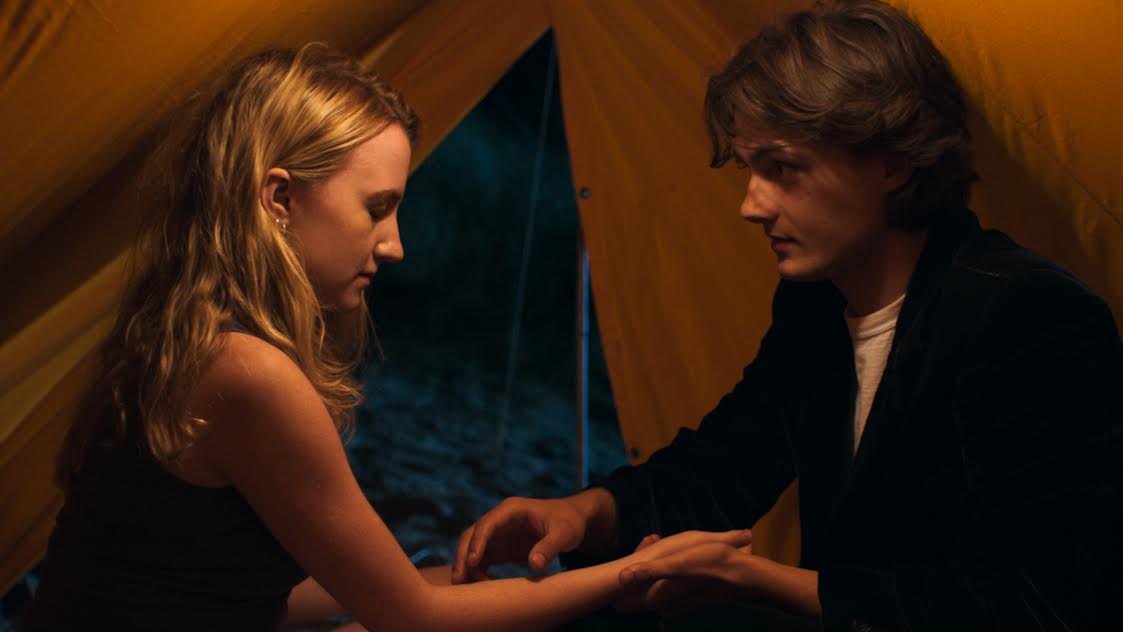
Evanna Lynch and George Webster on the set of “My Name is Emily”.
Spending days together on the road in an antique car, there is not a lot for Arden and Emily to do other than get to know one another and reflect on their wounds and their brokenness. The two characters help each other grow and mature. Evanna gave a little more insight into their personal interior journeys:
I think that’s Arden. He’s constantly challenging her in several ways, and he’s not trying to be better than her or win her or anything. He’s just charming her by being himself and not being ashamed of that in a way that she isn’t. Because I think she has this sense that she has to be smarter and be ahead of everyone and be so mature all the time. And Arden literally just comes to her with his heart in his hands [laughs], and he’s not trying to embellish that, and that’s disarming to her. […] I think it’s that bit in the car as well, where he gets angry with her about what she’s stolen from the shop, and then he tells her that, ‘You don’t know everything.’ Oh, and there’s another bit where he says, ‘You don’t ask, so you don’t know.’ And I think she realizes how she has actually been quite selfish and how she has underestimated him, and just because he’s not showing everything of himself doesn’t mean there isn’t more there. And I think that’s very shocking for her, and she hadn’t realized that she was that way. That is a hurtful thing to say, to tell someone, ‘You are actually selfish. You don’t ask these things. You don’t think about other people,’ and that really pulled her up that she’d missed that ability to care and to love and to let other people in.”
The fictional storyline that My Name Is Emily offers may be a source of inspiration for viewers, but director Simon Fitzmaurice brings an additional, real-life inspirational tale to the film – his own. Diagnosed with ALS in 2008, the award-winning short film director refused to let increasing paralyzation stop him from achieving his dream of creating a feature-length film. Simon wrote the script for My Name Is Emily with his eyes, using Eye Gaze iris recognition software, and started an Indiegogo project in 2013 in order to raise funds to begin filming.
After seeing My Name Is Emily, it became clear that Simon’s courageous journey was instrumental to the emotional power of the film. When asking Evanna what it was like to work with Simon, she said that she knew Simon was going to be “an amazing inspiring force” even before she met him.
He just has such an incredible passion for life and for art and story, and I really believe that urge to be a storyteller and to express what’s in his soul and what’s in his heart – that is what drives him. That’s what keeps him alive, really, and I know I just wanted to be around someone who had come through these things and had stared death in the face and decided to live, because I think we all have moments where we question what’s our purpose in life, and we are not sure, and we fumble about for that, and Simon has always been so clear, so crystal clear on what it is he’s meant to do in the world, and doesn’t have any doubts.”
Like the characters of Emily and Luna, Simon shares Evanna’s drive to be himself without caring what others think of him. Evanna admired this as one of Simon’s many strengths and its effect on the atmosphere around set:
[…] that’s actually kind of rare to find in an artist because we’re sensitive souls, inherently, and I think, being so sensitive, you often are victim to other people’s opinions, and Simon doesn’t… nothing holds him back, and I love that about him. On set I remember being struck by how he would always… he would just say what he was feeling – he had to be very economical with his words, actually very direct because obviously he can’t waste words the way we can – and I remember just [when] he called George and [me] over to him, and he literally just said, ‘I love you,’ because he was just so sweet and disarming, and it made me think… it was like, ‘Oh, he does that because he doesn’t give a [censored] what people think because he knows that… he’s been told so many times that he could die, so he’s not going to let stupid insecurities and social – I don’t know – appropriateness… he’s not going to let that stop him from expressing himself, and that totally inspires me: how fearless he is in his self-expression.
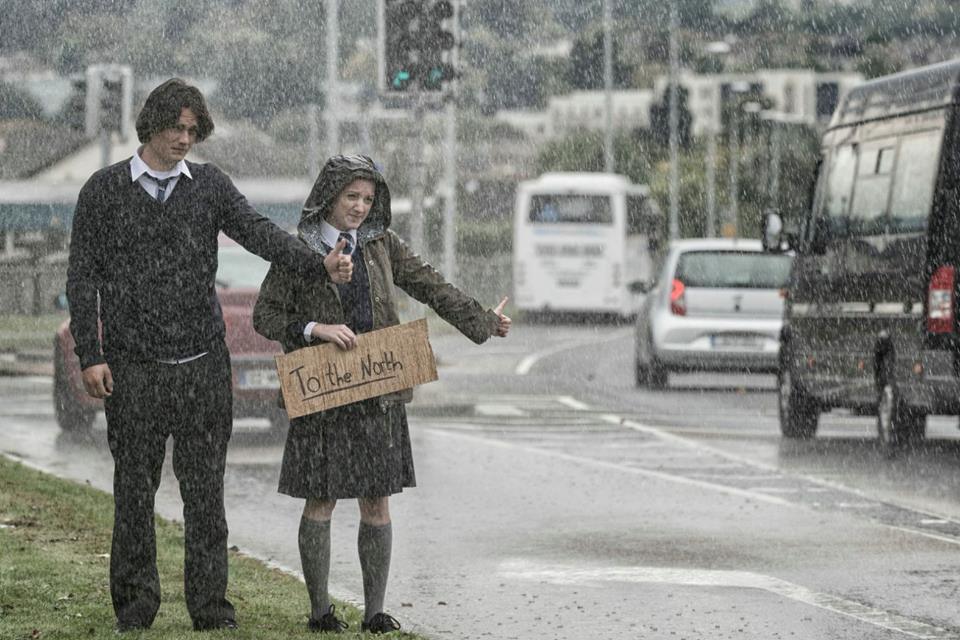
Evanna Lynch and George Webster on the set of “My Name is Emily”.
Simon Fitzmaurice and Evanna Lynch’s tale of independence, vulnerability, and staying true to one’s self has already made its debut around the world and won five of nine film festival awards nominations.
Evanna Lynch’s new film, My Name Is Emily, will be released in the United States (in New York and Los Angeles) on February 17. The film will be available through Video on Demand starting February 24. We are excited to see another wonderful film from Evanna coming just around the corner – in less than a week!
Evanna discussed more about the film, insight into her character, the most challenging aspect of the role, and what is was like to return to her home in Ireland after living in Los Angeles. Read this and more in the full transcript of our conversation with Evanna below:
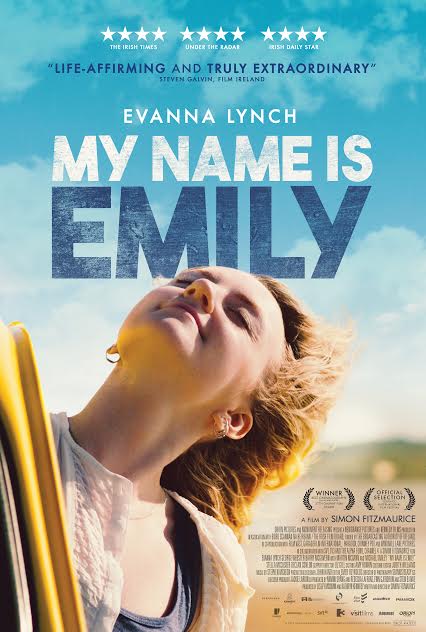
Evanna Lynch , “My Name is Emily”

